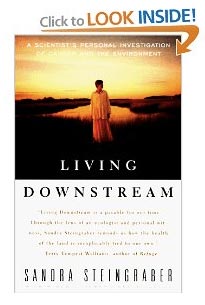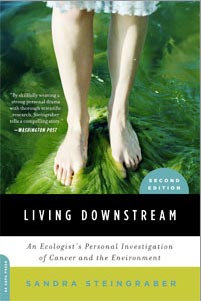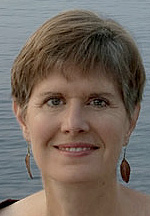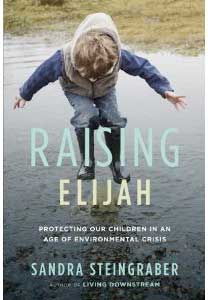Directed primarily at pregnant and nursing women and babies, Living Downstream discusses the effects that pollution and toxins have on us through our interconnected food chain.
Sandra Steingraber is an internationally recognized expert on the environmental links to cancer and reproductive health. She lives in Ithaca, New York. Read More
A Bridge to Somewhere - Responding to the President's Cancer Panel Report (Part 3) - July 8, 2010
Over the past nine weeks, the President’s Cancer Panel report has been provoking passionate responses from across the country. In a recent editorial, the Los Angeles Times praised the report for broadening the discussion of cancer to include environmental carcinogens and for pointing out how woefully inadequate is our system of regulating them. Likewise, the National Council of Churches applauded the panel for its focus on children, who are more vulnerable to the harmful effects of chemical pollution and in whom cancer rates are rising.
By contrast, an editorial in Chemical & Engineering News condemned the report as alarmist, and the American Cancer Society called it “unbalanced.”
It’s easy to guess what the editor-in-chief of the American Chemical Society’s weekly magazine might find objectionable—perhaps the report’s conclusion entitled “Safer Alternatives to Many Currently Used Chemicals Are Urgently Needed.” But an attack by the nation’s leading cancer charity against a report that argues for cancer prevention via stronger environmental reform deserves a closer look. Especially since one of the report’s authors, oncologist LaSalle Leffall, is a former national president of the American Cancer Society. (And it was George W. Bush who appointed both Leffall and his coauthor, immunologist Margaret Kripke, to their posts—hardly preconditions for a radical takeover.)
See: Living Downstream: The Film (2010)
Directed by Chanda Chevannes
See: Sandra Steingraber. "Shale Game". Orion Magazine. May/June 2010.
See: Sandra Steingraber. "The Whole Fracking Enchilada". Orion Magazine. Sept/Oct 2010.
In the absence of federal policies that are protective of child development and the ecology of the planet on which our children's lives depend, we serve as our own regulatory agencies and departments of the interior...
Thoughtful but overwhelmed parents correctly perceive a disconnect between the enormity of the problem and the ability of individual acts of vigilance and self-sacrifice to fix it.
Environmental awareness without corresponding political changes leads to paralyzing despair...We feel helpless in our knowledge, and we're not sure we want any more knowledge.
You could call this well-informed futility syndrome. And soon enough, we are retreating into silent resignation rather than standing up for abolition now.
--Sandra Steingraber. Raising Elijah. 2011.
"We shouldn't wreck this place down, right, Mom?"
--Elijah, age six,the author's son.
“Eco-biologist, cancer survivor, activist, mother of two, and author of books about environmental hazards and their effects (including Living Downstream and Having Faith), Steingraber applies her knowledge and philosophy to the challenge of raising children in our toxic, climate-threatened world. She connects many child health issues, including asthma, behavioral problems, intellectual impairments, and pre-term birth to hormone-disrupting, brain-damaging, and otherwise dangerous environmental factors. Chapters tackle weighty problems–diminished fertility; how chemicals infiltrate mothers’ milk; air quality and the ozone hole; neurotoxicology; hydraulic fracturing–and how they affect children and families. Two major themes emerge: first, current environmental policies must change to safeguard and support the health of children and, second, we must end our dependence on toxic fossil fuels. Less a guidebook for conscientious parents than an alarming and sobering human rights polemic, the book’s narrative is nevertheless a persuasive, personal call to action.” —Publisher’s Weekly
See: Living Downstream: An Ecologist's Personal Investigation of Cancer and the Environment
See: Mira's Story: My Amazing Daughter's Fight Against Cancer
See: Poisoned profits : the toxic assault on our children
See: The Case for a Truth and Reconciliation Commission on Toxic Hazards
See: Fracking: Implications for Human and Environmental Health
See: Food and Water Watch








